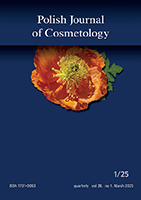search by
Copyright @ Pol J CosmetolEvaluation of the efficacy of copper lactobionate and copper lactate in preparations for personal hygieneAleksandra Pietrzak 1/, Piotr Wysocki 2/, Eligia M. Szewczyk 2/ 1/ Zakład Syntezy i Technologii Środków Leczniczych Katedry Chemii Medycznej Uniwersytetu Medycznego w Łodzi 2/ Zakład Mikrobiologii Farmaceutycznej Uniwersytetu Medycznego w Łodzi Summary Aim. This article is aimed at evaluation of the efficacy of copper lactobionate and copper lactate in relation to Candida albicans fungi in the context of the use of these compounds as components of women´s personal hygiene cosmetics. The studies involved the effects of these preparations on natural flora of the body´s intimate areas. Furthermore, the studies pointed to the possibility of simultaneous use, in these preparations, of essential oils known for antibacterial effects. Methods. The antifungal and antibacterial activity of copper lactobionate, copper lactate, tea oil, and Betamix oil was determined. The effects of the examined compounds on two strains of microorganisms: standard strain of Candida albicans ATCC 10231 and environmental strain of Lactobacillus acidophilus isolated from the vagina were determined. The microorganisms sensitivity to the examined substances was determined using the minimal inhibitory concentration (MIC) value indicating the concentrations at which these compounds inhibit the growth of microorganisms in vitro. Results. Copper lactobionate and copper lactate exhibit antifungal and antibacterial effects in relatively high concentrations - respectively 15.0 mg/ml and 7.5 mg/ml and 1.1875 mg/ml and 0.46875 mg/ml. Both compounds, although it is more visible in case of copper lactobionate, exhibit synergistic effects with the oils used in these studies, especially in the mixture with tea oil. In the mixtures the MIC value for single substances was reduced as much as four times (mixture of copper lactobionate and tea oil). Conclusions. The studies indicated weak antimicrobial effects of examined copper compounds and confirmed a good antifungal and antibacterial activity of tea oil and Betamix oil. They showed however that the substances contained in them, similarly as copper lactobionate and copper lactate described in this article, affected bacteriostatically the Lactobacillus acidophilus bacteria which constitute a natural bacterial flora of the vagina. At the same time the indicated synergistic intercation of the compounds - organic bonds of copper and essential oils, especially tea oil, creates interesting prospects for further studies. Key words: copper lactobionate, antifungal effects, essential oils, personal hygiene cosmetics. |




